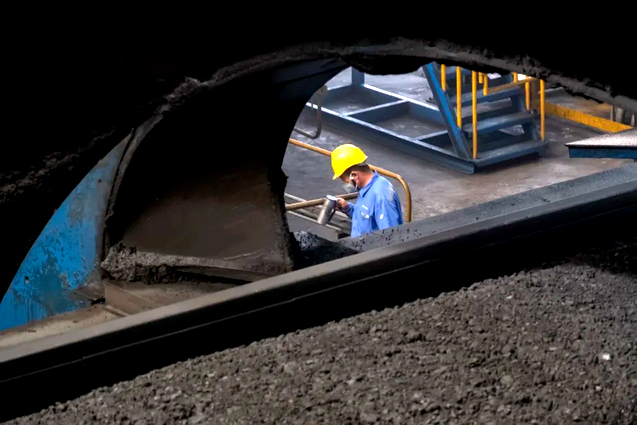Author Cheryl Durrant is a climate councillor and former director of preparedness and mobilisation at the Australian Department of Defence. |
As China is the largest carbon dioxide emitter and the largest fossil fuel importer, its actions reverberate globally. And with the China-Australia relationship at a low-ebb it looks like Australia’s thermal and coking coal exports to China could be taking an early hit.
China’s recent announcements are not surprising. While the eye of the world has been on COVID-19, China has experienced some of its worst flooding in recent decades, affecting more than 60 million people, disrupting food supply, and testing the limits of the giant Three Gorges Dam. China gets the existential nature of climate change risks.
 |
| A worker monitors the coal dumping process at the Caofeidian Port in Hebei Province. Credit: Sanghee Liu |
Notwithstanding Australian and other nations’ valid concerns about the nature of Xi Jinping’s China and its ability to deliver on its net zero pledge, it makes sense for China to attempt to regain some lost ground ahead of a possible Biden victory in the upcoming American elections.
Reported curbs on Australian coal imports to China might fit in with this diplomatic narrative. While it’s uncertain what is behind the ban or whether it extends to both thermal and coking coal, the timing certainly sends a signal to Australia.
Whether this signal becomes an enduring trend will need to be closely monitored. Initial modelling of the impact of China’s transition to renewables suggests it will benefit economically from a clean energy shift. China’s shift to net zero emissions could also accelerate the take up of green industries and technologies worldwide, such as green steel, electric or hydrogen vehicles powered by renewables.
It does this by creating a much bigger market for these technologies, much sooner. In Defence we used to say “in warfare, mass has a quality all of its own”. What China’s shift does is create a massive future market for green industries, driving price down and accelerating current trends, increasingly making renewable and green industries a cost-effective choice. Of course, whether China can accelerate action to match its words is another thing.
Countries like Australia, whose economy is tightly coupled to fossil fuels should anticipate economic shocks ahead unless we move swiftly to diversify our economy and embrace our potential as a clean energy exporter.
Not only is Australia heavily reliant on fossil fuels now, as a percentage of overall exports, but if the government’s rhetoric is to be believed we are about to embark on substantial taxpayer funded fossil fuel infrastructure investments, in particular gas. Given global energy trends, it’s difficult to see how this makes domestic prices cheaper, or the value of Australian exports higher.
If China does follow through with decisive action this creates a double whammy for Australia’s energy security – not just hitting our future economy but also isolating us internationally. Both the Foreign Affairs, Defence and Trade White Paper and Defence’s recent Strategic Update flag China’s rising influence in the Pacific and the need for Australia to work harder to maintain its standing in a region where many countries face extreme climate risks.
The Pacific has long recognised climate change as the single greatest threat to its security and wellbeing and grown more and more impatient with Australia’s recalcitrance. With Europe and China onboard with a mid-century net zero target and with Europe’s clean COVID-19 recovery, Australia’s “gas led recovery” now looks to be swimming against the tide of international sentiment. A Biden election win in the United States would entrench Australia further in a group of carbon polluting powers, alongside Russia and Saudi Arabia.
This is where environmental, economic and traditional security strategies come together in the national and the global interest. With a net zero target China achieves reduction in its environmental risks, gains potential economic advantage, and builds global influence from its current low point. It also opens the door on enhanced global collaboration on climate change, should Biden succeed in the US Presidential election.
This global collaboration is urgently needed to avoid tipping the planet into a Hothouse Earth trajectory, which threatens global civilisation itself. China’s policy has “strategic coherence” and a long-term goal.
In contrast Morrison’s Australia, and Trump’s America have three-word slogans and a lot of misplaced optimism.
Links
- Chinese companies given 'verbal notice' to stop importing Australian coal
- BHP's Chinese customers seek to defer Australian coal
- Old king coal has surrendered to solar, says global power report
- China's Zero Emissions Target Puts Australia On Notice
- China Changes The Game On Climate Action, For Renewables And For Coal
- Climate Change: China Aims For 'Carbon Neutrality By 2060'
- (AU) China's Surprise Climate Pledge Leaves Australia 'Naked In The Wind', Analysts Say
- China Is Rapidly Building A World-Beating Wind Energy Revolution

No comments :
Post a Comment